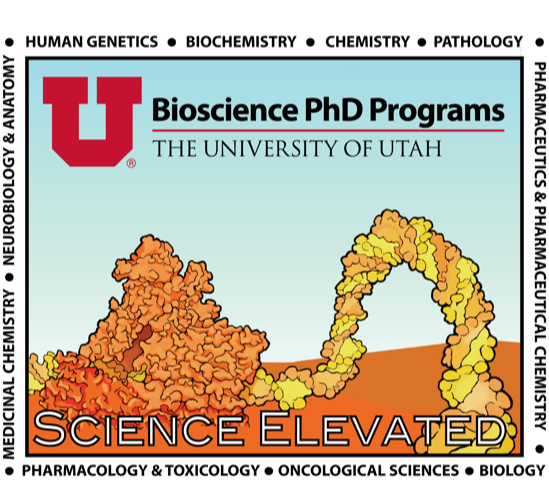Biosciences PhD Program Comparison
The Molecular Biology (MB) Program and Biological Chemistry (BC) Program are two complementary
interdepartmental PhD programs at the University of Utah that are housed under the
Bioscience PhD Programs umbrella. They are designed to support multidisciplinary science
and extensive collaboration among our MB and BC research groups, enriching an already
diverse and vibrant PhD student training environment.
The research interests of the faculty in the MB and BC Programs overlap extensively, and this is reflected by the fact that many faculty members participate in both programs.
The Biological Chemistry and Molecular Biology PhD Programs offer a variety of course work that provides a grounding in the wide range of scientific disciplines that are critical components on modern research. During the first year course of study, MB and BC students take several core courses focused on the the research objectives of the students as well as their respective program faculty. All first-year MB and BC students begin with a half semester program specific Foundations course and then choose from the same list of Fall Selectives and Spring elective courses, and also participate in the Critical Thinking in Research, and Guided Proposal Preparation courses leading to a written and oral capstone exam.
Some of the most important similarities and differences between the MB and BC Programs are highlighted in the outline below. To avoid confusion and delays in processing applications, students are asked to apply to only one of the two programs. Students should identify the program that best accommodates their research interests and provides the most appropriate core curriculum. If you have any questions about either program, and/or their relationships to one another and the participating departments, please feel free to contact us.
|
Biological Chemistry PhD |
Molecular Biology PhD |
|
|---|---|---|
Director |
Shawn Owen | Jason Shepherd |
Research Areas |
Enzymology Biophysical Chemistry Biophysics Metabolism Computational Biology Bioorganic Chemistry Structure & Function of Proteins and Nucleic Acids Physical Chemistry of Macromolecules |
Cell Cycle and Signaling |
Participating Departments |
Biochemistry Biological Sciences Chemistry Medicinal Chemistry Oncological Sciences Molecular Pharmaceutics Pharmacology & Toxicology |
Biochemistry |
Faculty and Graduate Students |
Active Faculty ~90, Active Students ~80 |
Active Faculty ~180, Active Students ~175 |
Typical First Year Curriculum |
Foundations of Biological Chemistry (1/2 Semester) Ethics in Science Research 2 Fall Selective Courses (1/2 Semester) Biophysical Methods |
Foundations of Molecular Biology (1/2 Semester) Ethics in Science Research 2 Fall Selective Courses (1/2 Semester) Advanced Genetics |
|
|
2 Elective Courses (1/2 Semester) Fundamentals of Pharmacokinetics |
2 Elective Courses (1/2 Semester) Animal Models |
|
|
Critical Thinking in Research Guided Proposal Preparation Written & Oral Capstone Exam |
Critical Thinking in Research Guided Proposal Preparation Written & Oral Capstone Exam |
Laboratory Rotations |
3 laboratory rotations At the end of Spring semester choose a thesis advisor and lab from rotations |
3 laboratory rotations At the end of Spring semester choose a thesis advisor and lab from rotations |
Second Year and Beyond |
After the first year, each student's education will be conducted under the policies of the participating department of the Thesis Advisor.
|
After the first year, each student's education will be conducted under the policies of the participating department of the Thesis Advisor.
|
